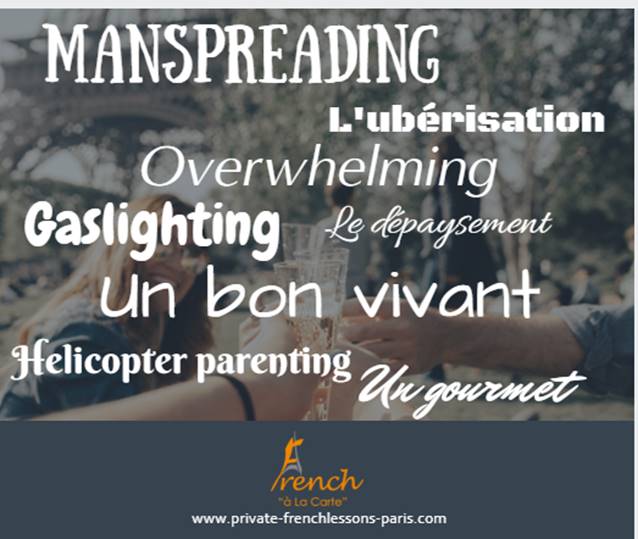Words in French and English That Can’t Be Translated
- SUBSCRIBE
- ALREADY SUBSCRIBED?
BECOME A BONJOUR PARIS MEMBER
Gain full access to our collection of over 5,000 articles and bring the City of Light into your life. Just 60 USD per year.
Find out why you should become a member here.
Sign in
Fill in your credentials below.
Some very common words or expressions in English or French can’t be translated by a single word in the other language. They require several words or another expression to express precisely their meaning.
For cultural reasons, some words, expressions or even neologisms have no real equivalent in the other language. They reveal a part of the culture, the linguistic patrimony, and reflect the specific identity of a country.
I have selected a few of them, specific to the French or English language, which are untranslatable, difficult to translate in the other language, or need more words to explain their meaning.

Courtesy of French à La Carte
French words that can’t be translated by one word in English
Le dépaysement
This word express the feeling of complete change of scene when one travels in another country. It describes the feeling of disorientation and strangeness one might feel upon being in a totally foreign environment. It doesn’t only apply to physical movement; it could also be to used to describe a change of mental state or feelings as a result of any major life event. This word often crops up in lists of the world’s best untranslatable words
« J’ai adoré le Japon. C’est le première fois que le dépaysement était si fort »
“I loved Japan. It’s the first time that the feeling of disorientation and bewilderment was so strong.”
Bon vivant
A bon vivant is someone who has cultivated, refined, and sociable tastes especially with respect to food and drink. If you are a bon vivant, you probably have an active social life. Bon vivants are known for their love of socializing. The phrase in French originally meant “one fond of good living or one who lives well”– derived from bon, good, and vivre, to live. The expression has been adopted in English, and is frequently used since a similar expression doesn’t exist.
« Paul adore s’amuser, sortir, diner des les bons restaurants. C’est un bon vivant »
“Paul loves having fun, going out, having diner in the good restaurants. He is a bon vivant. [Or: he is someone who enjoys the good things in life.]”
Un gourmet
A gourmet is a connoisseur of good food; a person with a discerning palate. In the early 19th century, this word originally meant “wine taster.” It might not be a coincidence that in a country where food has always held great importance that the French have invented such a specific word devoted to its appreciation. This word should not be confused with gourmand which an adjective used for a person who enjoys eating food in large quantities and often eats too much.
« Stéphane est un gourmet, il ne mange que les produits les plus raffinés »
“Stéphane is a food connoisseur, he only eats the most refined products.”
Une grasse matinée
The French expression “une grasse matinée” means to sleep in, to stay very late in bed in the morning and not to get up before 11 am or 12 noon. This compound noun, conveyed by a nominal phrase in French une grasse and matinée, is conveyed by a verbal phrase in English, “to sleep in.”
« Ce matin Alice est fatiguée et fait la grasse matinée »
“This morning Alice is tired and sleeps in.”

Une grasse matinée. Courtesy of French à La Carte
L’ubérisation
It’s interesting to note that this neologism invented in 2014 appeared in France, a country for which globalization represents a certain threat to social security. This word has no equivalence in English. “Uberisation” takes its name from Uber, the global company behind the chauffeur-driven car service. The characteristics of this service are first the significant financial gains related to avoiding the regulatory and legislative constraints of traditional competition (the acquisition of a taxi license is quite expensive in France). This new word is often used in the media in a pejorative way, as a critique of global companies in the transportation/car industry (Uber) or in tourism (Airbnb) that provide affordable services but pay very low income and provide no social protection to their employees.
« L’utilisation de salariés free lance est devenu très courante dans les sociétés, c’est une forme d’ubérisation »
“Working with freelancers has become very common for companies; it is a sign of social and job insecurity.”
English words that can’t be translated by one word in French
Helicopter parenting
This word– used to speak about parents who pay extremely close attention to their children’s experiences and problems, particularly at educational institutions– doesn’t have an equivalent in French. This expression translated into French as “Parents helicoptères” has never been commonly used in French. One of the reason could be that the concept of parenting is different between French and English parents. For Pamela Druckerman, the author of the popular book Bringing Up Bébé, American mothers are more child-centric than French mothers. “They [the French] assume that even good parents aren’t at the constant service of their children, and that there is no need to feel guilty about this.” This cultural difference may explain why this concept doesn’t exist in French.
“I know many helicopter mothers at my son’s school.”
« Je connais de mères étouffantes et possessives avec leur enfants à l’école de mon fils »

A hug. Courtesy of French à La Carte
A hug
This expression of warmth and friendliness with arms outstretched around the other doesn’t exist in French– not even with family members. You do not greet French people with a hug (unless it’s a child). You do cheek kisses, faire une bise. Sometimes it’s one on each cheek and depending on your social circle and region of France, you may go for three or four bises. But whatever you do, don’t go in for the hug. The closest translation in French would be simply “to take someone in your arms,” prendre dans les bras or faire un câlin (to cuddle)– but these terms describe a romantic gesture or something you do with kids or to console someone. Hugging in France is never used as a greeting.
“My friend gave me a hug to comfort me.”
« Mon ami m’a serré dans ses bras pour me réconforter »
Gaslighting
This word originally comes from the movie Gaslight (1938) and is used in both clinical health jargon and the common language to describe a form of psychological manipulation, intimidation, or psychological abuse. The equivalent doesn’t exist in French. A Wikipedia page has been created in French but using the English word. One of the reasons might be because the French diagnostic approach to mental disorders is different than in the U.S. and doesn’t categorize the same mental disorders.
The closest word you will find in French will be a combination of mentir (to lie) and manipuler (to manipulate) with a goal to destabiliser (to destabilize). In this case, we would rather use the English word even if it doesn’t please the very strict Académie Française, the institution that regulates and protects the French language against the unwanted English words that slip into French.
“Claire gaslights me by hiding my keys and making me believe that it’s me who lost them.”
« Claire pratique le mensonge et la dissimulation en me cachant volontairement mes clés puis en me faisant croire ensuite que c’est moi qui les ai perdues »

Overwhelmed. Courtesy of French à La Carte
Overwhelming
As a nonnative, this adjective is confusing as it is frequently used in spoken English and can be translated it in French by several words depending on the context. According to the Collins dictionary, this word, when used as an adjective, means “overpowering in effect or strength.” The Larousse English-French dictionary translates it as “écrasant, accablant“– which is not used in spoken French but rather in literature. “Intense” seems to be the correct translation. When the adjective overwhelmed is used to describe a strong emotional effect on someone, the translation will be bouleversé(e).
“A French lesson four times a week is too overwhelming a pace for me.”
« Quatre cours de français par semaine c’est trop intense pour moi.»
“The sad news overwhelmed me.”
« Les tristes nouvelles m’ont bouleversée. »

Manspreading. Courtesy of French à La Carte
Manspreading
This neologism first used by American feminists to describe men who spread their legs — particularly on subway trains– is used to express the sexual aggressiveness of the posture. The word first appeared when the Metropolitan Transportation Authority (MTA) in the New York metropolitan area promoted 2013 poster campaigns encouraging respectful behavior. This new word appeared in the Oxford Dictionary in 2014 and other words starting with the prefix “man” have been created: mansplaining and manslamming. It’s maybe not a coincidence that these English neologisms originated in the United States, a country where the struggle for gender equality started before spreading to other countries. There is a French Wikipedia page dedicated to this word (but with the English word) and it is still the English term that is used internationally in other countries.
“Manspreading is a common behavior on public transport.”
« Le fait que les hommes en écartant leur jambes prennent beaucoup de place dans les transports en commun est un comportement largement observé »
Lead photo credit : Photo: Léo Mabmacien/ Flickr






REPLY